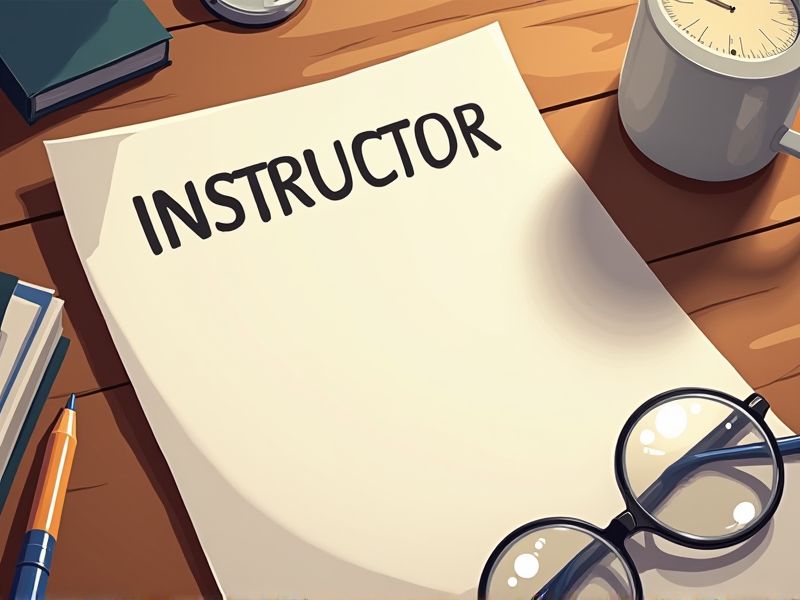
Parachuting involves inherent risks that require specialized knowledge to manage effectively. Instructors must demonstrate proficiency in safety protocols and emergency procedures to ensure the well-being of both themselves and their students. Certifications validate their expertise and adherence to industry standards, providing confidence to prospective skydivers. Here are key certifications essential for a Parachuting instructor.
USPA Accelerated Freefall (AFF) Instructor Certification
The USPA Accelerated Freefall (AFF) Instructor Certification ensures instructors possess extensive knowledge of skydiving techniques and safety protocols, reducing the risk of accidents during parachuting instruction. Having the certification signifies that instructors have met standardized training criteria, which fosters trust and confidence among students who rely on their expertise. This certification also provides a structured methodology for teaching critical skills, which enhances the learning experience for new skydivers. Without it, the consistency and quality of instruction across different skydiving schools could potentially suffer, affecting overall industry standards.
USPA Tandem Instructor Certification
The USPA Tandem Instructor Certification is crucial as it ensures instructors are equipped with the necessary skills and knowledge to safely conduct tandem parachute jumps. This certification sets industry standards for safety procedures, reducing the likelihood of accidents during tandem skydives. By obtaining this certification, instructors demonstrate proficiency in both technical and safety aspects of parachuting, which instills confidence in students. The rigorous training and evaluation process of the certification help maintain a high quality of instruction within the parachuting community.
USPA Static Line Instructor Certification
The USPA Static Line Instructor Certification ensures instructors have the necessary skills to safely guide novice parachutists during their initial jumps. Without this certification, there's a higher risk of accidents due to lack of standardized safety and deployment procedures. It builds trust among students, knowing their instructors have met rigorous industry standards. This certification also contributes to industry-wide benchmarks for safety and instructional quality, supporting the integrity of the parachuting profession.
USPA Advanced Freefall Instructor Certification
The USPA Advanced Freefall Instructor Certification ensures instructors are equipped with the skills necessary to teach complex skydiving techniques safely. Without this certification, the risk of accidents increases due to inadequate training methods. It provides validation of the instructor's knowledge of freefall dynamics and emergency procedures critical to student safety. This certification enhances credibility and trust for skydiving schools, attracting more students and potentially increasing business.
USPA Parachute Rigger Certification
USPA Parachute Rigger Certification ensures that parachuting instructors possess the necessary skills to maintain and pack parachutes safely. The certification verifies the instructors' ability to identify and rectify any potential issues with the equipment, which is crucial given the high-risk nature of parachuting. Holding this certification demonstrates a commitment to industry standards and enhances trust from students and fellow skydivers. Moreover, it aligns with regulatory requirements, fostering a safer skydiving environment overall.
CPR and First Aid Certification
CPR and First Aid Certification equips parachuting instructors with the necessary skills to manage emergencies such as cardiac arrest or injury during a jump. This certification enhances the safety of participants by enabling the instructor to provide immediate medical intervention if needed. The knowledge obtained through certification minimizes response time, crucial in life-threatening situations. Legal requirements often mandate such certifications to ensure a high standard of safety and professionalism in the field.
Emergency Medical Technician (EMT) Certification
EMT certification equips parachuting instructors with essential medical knowledge, enhancing their ability to respond effectively to potential in-flight injuries. Parachuting involves inherent risks, and having EMT skills ensures immediate medical intervention, potentially reducing the severity of injuries. Certified instructors can also provide critical first aid amid sparse emergency medical resources in remote drop zones. Regulatory bodies often require certifications like EMT to maintain high safety standards, thereby increasing parachuting industry's credibility and trustworthiness.
Aviation Safety and Operations Certification
Aviation Safety and Operations Certification ensures parachuting instructors have comprehensive knowledge of airspace regulations, reducing the risk of air-related incidents. Training provided under this certification equips instructors with emergency response skills, improving overall safety for both instructors and participants. The certification ensures adherence to standardized safety protocols, minimizing liability for parachuting schools. Possessing this certification increases trust among clients and insurance providers, leading to higher client satisfaction and lower insurance premiums.
Risk Management and Safety Systems Certification
Risk management and safety systems certification ensures parachuting instructors are equipped with the latest safety protocols to minimize potential accidents. Meeting these certification standards helps maintain the integrity of the training program and instills confidence in participants. It reduces liability for companies by demonstrating a commitment to adhering to industry regulations and best practices. Regular certification updates ensure instructors stay informed about new risks and advancements in parachuting technology or techniques.
Drop Zone Operations Certification
Drop Zone Operations Certification ensures that parachuting instructors can safely coordinate and manage operations on the ground, directly influencing safety standards. This certification provides instructors with the necessary skills to handle emergency situations effectively, reducing the risk of accidents. Certified instructors with knowledge of ground operations ensure that all equipment and protocols are checked and followed, maintaining the overall efficiency of parachuting activities. Certification also boosts the instructor's credibility and trustworthiness, impacting their employability and reputation in the parachuting industry.
Summary
You can expect increased trust in a parachuting instructor with certifications. Certifications indicate the instructor has met certain safety and skill standards. This leads to more reliable and structured training sessions. Enhanced reputation often attracts more students, boosting credibility and income.
